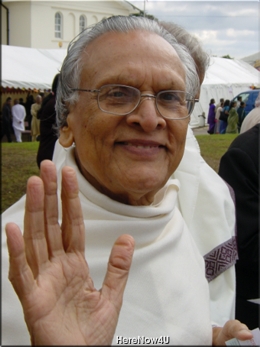
The Huffington Post
14.01.2013
By J.J. Craig
 This past July, I saw the Jain spiritual leader Gurudev Shri Chitrabanuji speak at the Young Jains of America convention in Tampa, Florida. He was on stage in front of an audience of nearly 700 Jain teenagers. Before he spoke, he was presented with a vegan cupcake to celebrate his 90th birthday. Why a vegan cupcake as a birthday present, I wondered?
This past July, I saw the Jain spiritual leader Gurudev Shri Chitrabanuji speak at the Young Jains of America convention in Tampa, Florida. He was on stage in front of an audience of nearly 700 Jain teenagers. Before he spoke, he was presented with a vegan cupcake to celebrate his 90th birthday. Why a vegan cupcake as a birthday present, I wondered?
The former monk Chitrabanuji graciously accepted his gift and then spoke passionately about the importance of adhering to the ancient principle of ahimsa or nonviolence in the modern age. He talked about how a vegan diet, not just a vegetarian diet, is the most nonviolent way to eat. He also encouraged changing the ancient practice of using ghee, clarified butter, for the ritual of lighting a lamp in worship. He asked that vegetable-based oil instead be used instead, stressing that society must unconditionally avoid the violence done by using animal products, such as meat, leather, milk, or butter.
I now understood what the vegan cupcake represented. Given my Western and Christian upbringing, though, I was amazed to see this monk suggesting a change in a tradition thousands of years old -- and even more amazed that 700 Jain teenagers were listening attentively. The room was silent, and the respect given this prominent figure in the Jain community was evident. I had come to this event as a guest speaker, and, as an outsider looking in, I could see something very deep in this simple call for reform. In fact, I believe this call to reform is the very thing that will keep the Jain community together for another thousand years.
The basic Jain value of nonviolence still demands respect, despite the roaring cultural changes and life-altering technological innovations of the 21st century. The teen sitting next to me, with spiked hair and ripped jeans, paused from texting and chatting long enough to hear Chitrabanuji's call for change. This is because at some point in his life he was taught this principle of nonviolence.
Yet Chitrabanuji was taking these teens to a higher level. He shows how to evolve an ancient religion while still holding onto its core values. The Jain diet and practice of worship, he suggests, moves closer to the value of nonviolence when veganism replaces vegetarianism. Promoting the ancient value of nonviolence in this way may actually be the thing that will help to stop the growing violence among young people in America. If creative or new approaches to ahimsa are encouraged, then children will become personally involved in deepening and developing the practice of nonviolence in their own lives.
Certainly, the shootings at Columbine, Virginia Tech, and now Newtown show young people's frustration, anger, and a desire to take matters into one's own hands. If youth are given opportunities to create their own expressions of nonviolence from a young age, then perhaps the tools of violence -- so often learned with a video game controller in their hand -- may be nullified.
Ahimsa or nonviolence may be promoted through its influence on youths' present actions. What might these actions look like? It could be limiting their exposure to certain movies or video games after realizing its impact on their thoughts and actions. It could be joining organizations that promote peaceful activities among their peers once they become aware of how it keeps communities together. It could mean removing dairy from their diet after recognizing the painful effect of mass milk production on cows. This could indeed lead to them requesting vegan cupcakes on their birthday, as Chitrabanuji received on his.
It is not the specific action they choose, or even the reason for it, that matters most, however. Every individual will find their own way and their own expression. What truly matters is the value of ahimsa that lies behind their choice. If values like ahimsa are taught in creative ways that deepen tradition, the positive impact on children's actions and interactions can only multiply.
J. J. Craig
spoke on the topic of mentoring at the annual Young Jains of America convention held in Tampa, Florida, in July 2012. She is an English professor with a PhD from the University of Glasgow in Scotland. Her research interests include cross-cultural communication and medieval to modern symbolism. She co-edited the book R/EVOLUTIONS: Mapping Culture, Community, and Change (2009) and helped proofread The Historical Thesaurus of the Oxford English Dictionary. Currently, she teaches English Composition and edits dictionaries for the Language Division of HarperCollins.